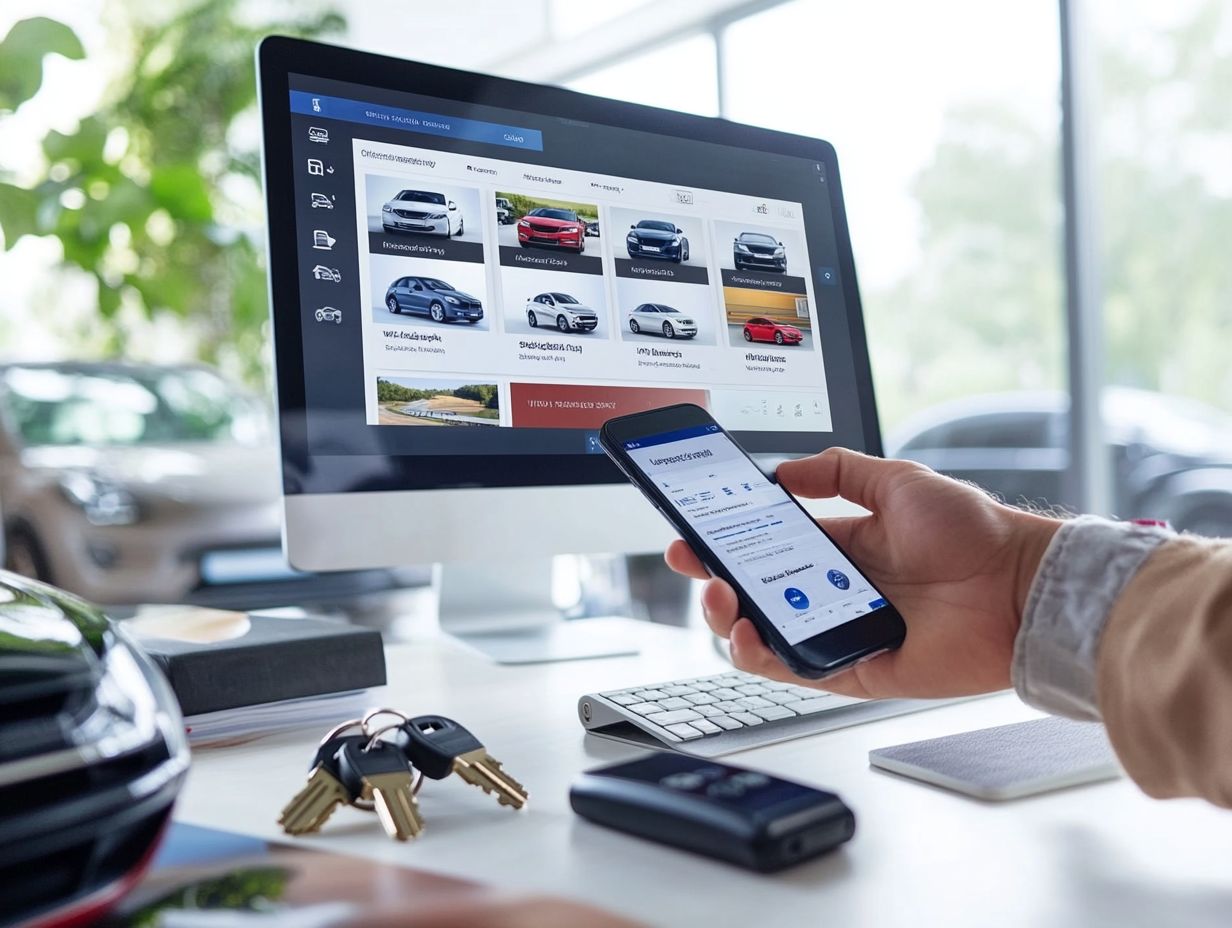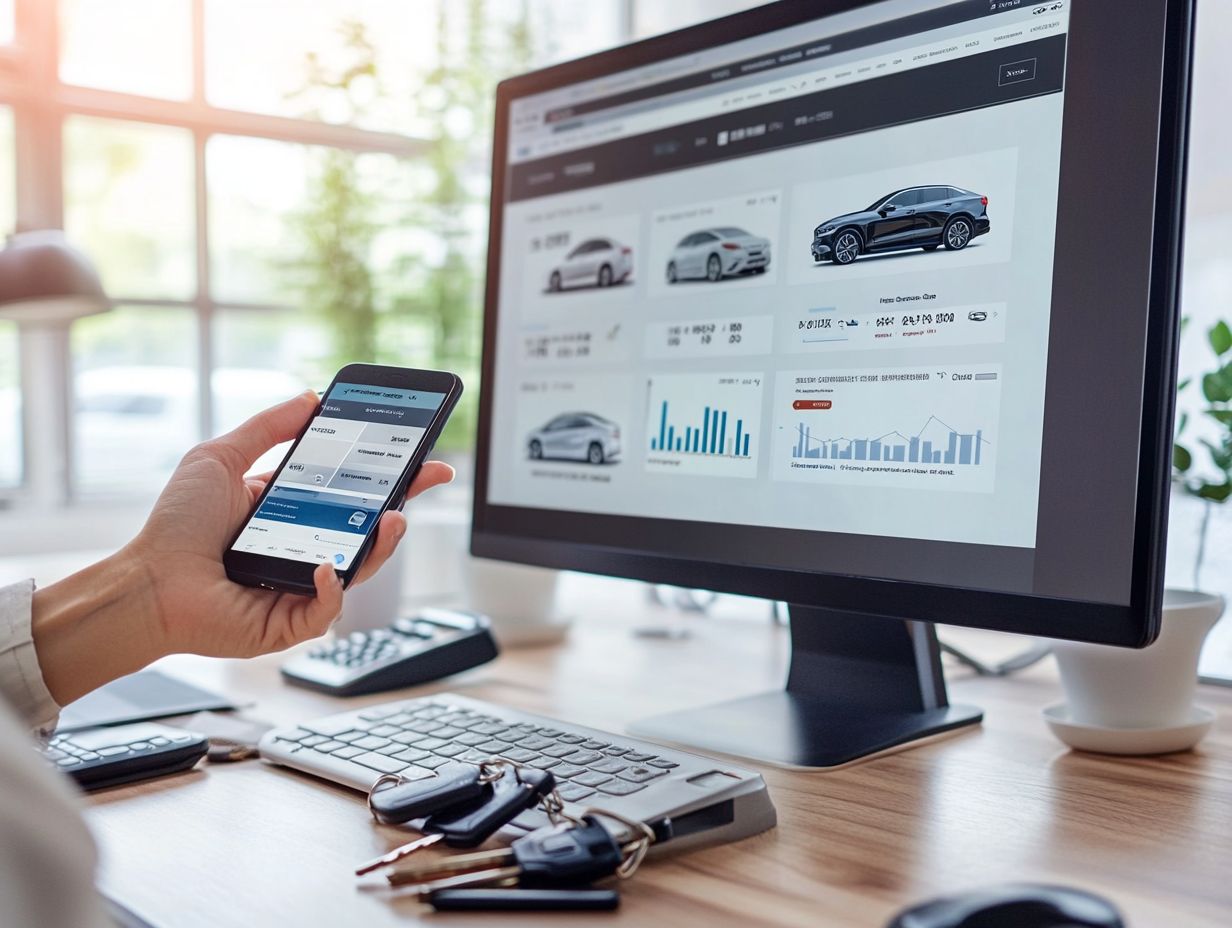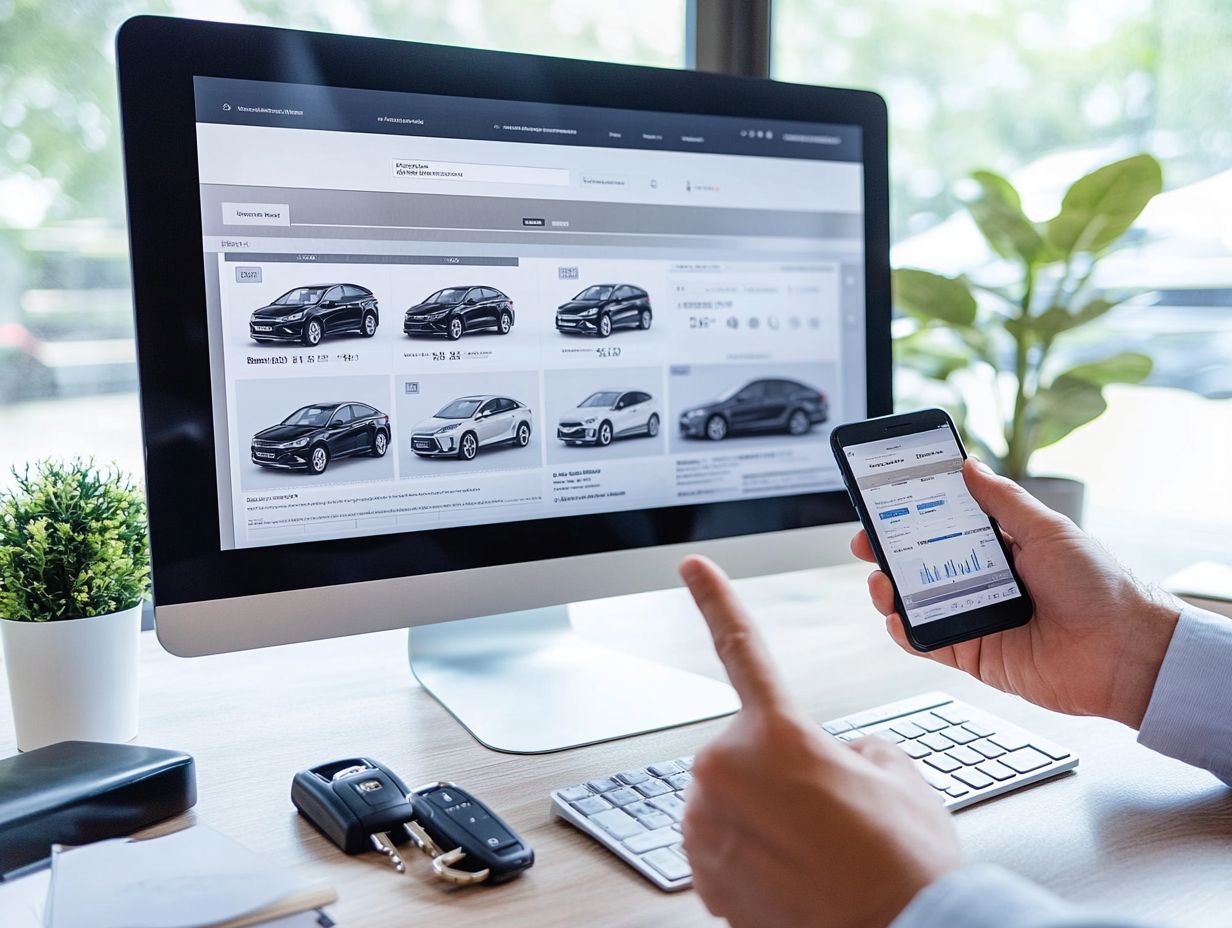How to Utilize Online Price Comparisons for Cars
When you’re shopping for a car, the quest for the best deal can indeed feel overwhelming. With a myriad of options and fluctuating prices, grasping the significance of price comparisons becomes essential.
This guide is designed to assist you in navigating the world of online price comparisons, from identifying trustworthy sources to evaluating critical elements such as features and hidden fees.
You’ll discover strategies for leveraging these comparisons to negotiate superior deals while steering clear of common pitfalls. Continue reading to empower your car-buying journey!
Contents
- Key Takeaways:
- Understanding the Importance of Price Comparisons for Cars
- How to Find Reliable Online Price Comparisons
- Factors to Consider When Comparing Prices
- Using Price Comparisons to Negotiate
- Avoiding Common Pitfalls in Online Price Comparisons
- Red Flags to Watch Out For
- Frequently Asked Questions
- 1. How do I use online price comparisons to find the best deal on a car?
- 2. Are the prices on online car comparison websites accurate?
- 3. Can I negotiate the price of a car based on the information I find from online comparisons?
- 4. Are there any hidden fees or charges that may not be reflected in online price comparisons?
- 5. How often are the prices on online car comparison websites updated?
- 6. Can I use online price comparisons for both new and used cars?
Key Takeaways:

- Comparing prices is crucial to ensure you get the best deal.
- Choose trusted sources for accurate and reliable information.
- Consider features, specifications, and additional costs that affect the overall price.
Understanding the Importance of Price Comparisons for Cars
In today s fiercely competitive vehicle market, grasping the significance of price comparisons for cars is crucial for you as a consumer. This understanding allows you to make informed decisions that enhance both your satisfaction and financial investment.
By effectively leveraging trusted resources like TrueCar, Edmunds, Kelley Blue Book, and AutoTrader, you can effortlessly compare prices, assess the Manufacturer’s Suggested Retail Price (MSRP), and uncover valuable insights into vehicle features and options. This thorough process helps you avoid overpaying and equips you to negotiate better deals with local dealerships, leading to a purchase experience that feels both empowering and confident.
Why You Should Compare Prices
Comparing prices empowers you to gain a thorough understanding of the market, helping you pinpoint the best offers from local dealerships on various vehicles. This helps you make smart choices.
By carefully evaluating different features such as fuel efficiency, safety ratings, and technological options you can identify which vehicle truly meets your needs without overspending. This practice helps you save money and feel good about your choices.
For example, if you re a family considering a fuel-efficient SUV, you can compare models side by side and uncover differences in warranty, maintenance costs, and resale value. These comparisons can lead to substantial savings and ultimately create a more rewarding ownership experience for you.
How to Find Reliable Online Price Comparisons
Finding trustworthy online price comparisons for vehicles is essential for you as a consumer looking to make informed purchasing decisions, especially when understanding car financing.
Resources like Kelley Blue Book, TrueCar, AutoTrader, and Edmunds provide you with invaluable insights into market prices and the experiences of other buyers, ensuring you’re well-equipped to navigate your options.
Researching and Choosing a Trusted Source

When you’re on the hunt for a reliable source to research vehicle prices, it s wise to gravitate toward well-known websites like Kelley Blue Book and Edmunds. These platforms are celebrated for their accuracy and reliability, offering comprehensive reviews and detailed breakdowns of vehicle costs.
Beyond these established resources, take the time to sift through user reviews and testimonials that showcase genuine experiences with vehicle purchases. Data accuracy is crucial; you want trustworthy price estimates that genuinely reflect current market trends.
Assess the comprehensiveness of your chosen source by examining how thoroughly it covers various makes and models, as well as key attributes like mileage, condition, and extra features. By prioritizing sources that provide in-depth insights and user feedback, you can make well-informed decisions that lead to more successful purchasing outcomes.
Don’t wait! Start your journey towards finding the best car deal now!
Factors to Consider When Comparing Prices
When you compare prices for vehicles, it’s essential to consider a variety of factors. The price suggested by the car maker, known as the Manufacturer’s Suggested Retail Price (MSRP), is just the starting point. You should also evaluate the vehicle’s features and specifications.
Don’t forget to account for any potential additional fees that could pop up during the purchasing process, such as dealership charges and taxes. Taking all of this into account will help you make a more informed decision.
Features and Specifications
Understanding the various features and specifications of a vehicle is crucial for you as a consumer. These elements directly influence the overall price and value of the car you’re considering.
Factors like engine power, fuel efficiency, and safety ratings can significantly affect a vehicle’s market appeal and, as a result, its price tag. Advanced technology features, such as infotainment systems car entertainment that includes music, navigation, and more adaptive cruise control, and lane-keeping assist, have become increasingly desirable, often leading to higher costs.
You need to carefully weigh these specifications against your personal needs and budget. While certain features may enhance your driving experience, they can also impact long-term ownership expenses. Grasping the intricacies and benefits of these specifications gives you the power to make informed decisions that align with your lifestyle and financial goals.
Additional Costs and Fees
Additional costs and fees tied to purchasing a vehicle can greatly affect the final price. It’s crucial to evaluate all potential charges, including dealership fees and taxes, throughout your comparison process.
Hidden charges, such as documentation fees essentially covering the processing of paperwork can catch you off guard. Destination charges, which are fees for transporting the vehicle from the manufacturer to the dealership, can also contribute to the overall cost.
Interest rates on financing, extended warranties extra protection against car repairs and optional add-ons, such as vehicle protection plans, significantly influence your total expenditure. These factors can reshape your budget and impact your satisfaction with the purchase.
By understanding these additional expenses, you give yourself the power to make informed decisions, ensuring you stay within your financial comfort zone.
Using Price Comparisons to Negotiate

Effectively utilizing price comparisons can be your secret weapon to getting the best deal with dealerships. By referencing quotes from reliable sources, you can substantiate your requests and strengthen your bargaining position, ensuring you secure the best possible offer.
Tips for Negotiating a Better Deal
To negotiate a better deal on a vehicle, employ strategic tips that elevate your bargaining power. Research market prices, gather quotes from multiple sources, and maintain a clear grasp of your budget and desired features.
By laying this groundwork, you’ll be equipped with essential information needed to advocate effectively for your needs. If you identify the average price of a specific car model from reputable sources, you can confidently aim for a price below that market average.
Creating a checklist of non-negotiable features will help you keep discussions focused. Imagine stepping into a dealership armed with a printed comparison of similar models and glowing reviews this not only demonstrates your knowledge but also puts pressure on the dealer to present an enticing offer.
Ultimately, the key to success lies in being both informed and assertive, transforming the negotiation into a collaborative process rather than a confrontational one. Don’t miss the chance to get the best deal!
Avoiding Common Pitfalls in Online Price Comparisons
Avoiding common pitfalls in online price comparisons is essential for you as a consumer striving to make informed decisions. Misinformation and unreliable sources can easily steer you toward poor purchasing choices, resulting in unnecessary financial loss.
Start your price comparison journey today and save big!
Red Flags to Watch Out For
When comparing prices online, watch for red flags. Prices that seem too good to be true or websites lacking transparency are warning signs.
Be cautious of sites without contact information or vague company details, as these often suggest a lack of credibility. If you see a product listed at a fraction of its typical market price without a legitimate justification, consider it a potential trick that gets you to buy something that’s not what you expected.
Always cross-check prices on reputable platforms to verify their accuracy and legitimacy. Be skeptical of customer reviews that seem overly generic or suspiciously positive; these could very well be fabricated.
Utilizing tools that show you past prices can assist you in ensuring that the deal you’re eyeing is authentic and not just a deceptive trend.
Frequently Asked Questions

1. How do I use online price comparisons to find the best deal on a car?
To use online price comparisons for cars, start by researching the best online resources for car comparisons that offer this service. Enter the make, model, and year of the car you are interested in.
You can also filter results by location, price range, and other factors. Once you have a list of options, compare the prices and features to determine the best deal.
2. Are the prices on online car comparison websites accurate?
While online car comparison websites strive for accuracy, the prices listed may not always reflect the final amount you will pay. Taxes, fees, and dealership incentives may not be included.
Always contact the dealership to get the final price don t miss out on the best deal!
3. Can I negotiate the price of a car based on the information I find from online comparisons?
Yes, you can use the information from online price comparisons to negotiate a better deal on a car. If you find that a similar car is being sold for a lower price elsewhere, use that as leverage to negotiate a lower price with the dealership.
While most online price comparisons for cars will include fees such as destination charges and taxes, there may be other fees that are not included. Documentation fees, dealer fees, and advertising fees might also apply.
It is important to read the fine print or contact the dealership to confirm all fees before making a purchase.
5. How often are the prices on online car comparison websites updated?
The frequency of price updates varies between different websites and tools. Some may update in real-time, while others might update once a day or once a week.
Check with the specific website or tool to determine how often prices are updated.
6. Can I use online price comparisons for both new and used cars?
Yes, you can use online price comparisons for both new and used cars. For new cars, it’s helpful to explore effective strategies for buying new cars online. However, used car prices may vary more due to factors such as mileage and condition.
It is crucial to research the history and condition of a used car before making a purchase based on the price comparison.






